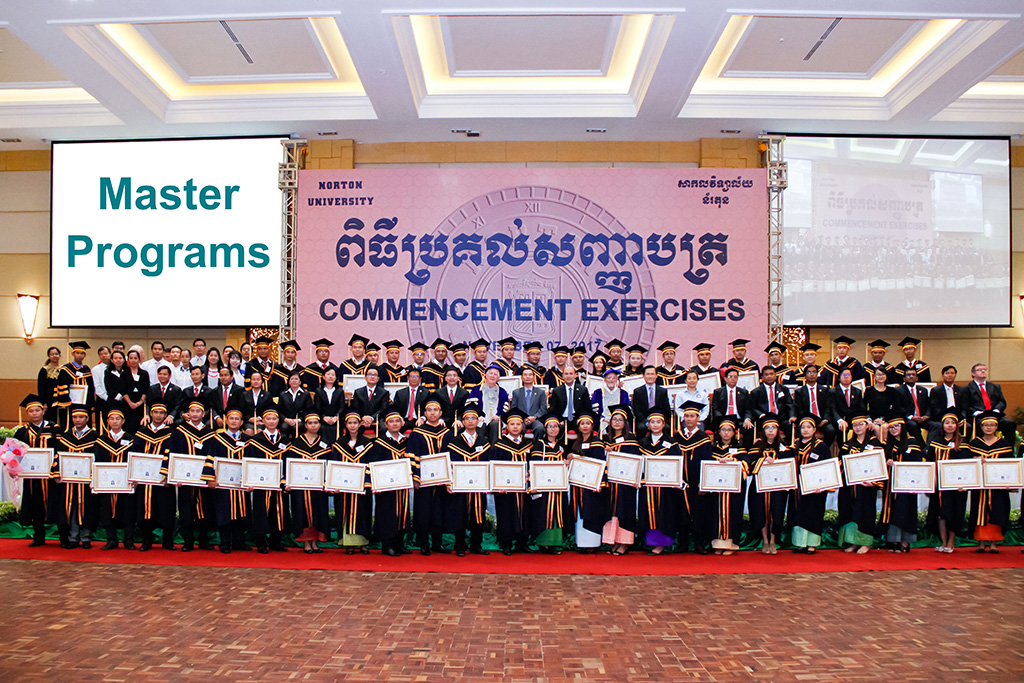OVERVIEW
The MDIS program covers both social and economic development issues in Cambodia and internationally which focuses on practices of local and international agencies.
This program allows students to gain better understanding of problems in a broader perspective and their possible solutions. It is designed for those who:
would like to learn more about issues and problems of social, economic and political development in Cambodia and throughout the world. It will help students to gain the experience in development management, and use that experience in a theoretical and comparative context. It helps to prepare for employment in improving Cambodia and other nations through NGOs, donor agencies or voluntary organizations. It will help enhance their skills and knowledge in specialist functional areas such as institution, social and economic development and also gain an appreciation of the role of research in proposing, managing and evaluating projects; and want to develop their specific people management skills such as group work, negotiation, cross cultural management and political skills.
The program emphasizes an appreciation of the importance of social difference and inequality, including gender relations, age, ethnicity and class, for an understanding of development policy and practice.
CURRICULUM STRUCTURE
Student needs to complete 54 credits to be considered for the award of the degree. This can be obtained on two tracks:
Thesis track – student takes 14 courses (42 credits), and writes a thesis (12 credits) that is then submitted in the official format. A final defense of the thesis is set with the presence of the official representatives from the Ministry of Education, Youth, and Sports (MoEYS).
Non-thesis track - student takes 14 courses (42 credits), and in lieu of the thesis, takes four more subjects (12 credits) one of which is a research report that is also submitted in the official format. Final submission of this report serves as the basis for the student to take the state examinations set by the Graduate School with official observers from the Ministry of Education, Youth, and Sports (MoEYS).
The GPA requirement in all courses must be met in both tracks.
SCHEDULE
This program is made available on weekends and weekdays.
1. For weekends (Physical):
Saturday: 2:00-5:00 p.m.; and 5:15-8:15 p.m.
Sunday: 8:00-11:00 a.m.; and 12:00-3:00 p.m.
2. For weekdays (Online):
Monday to Friday: 5:30-8:30 p.m.

COURSES
| Course Code | Course Description / Title | Number of Credits | Total Number of Credits |
|---|---|---|---|
| Basic Courses | 12 | ||
| GDI 101* | Statistics | 3 | |
| GDI 102* | Research Methods | 3 | |
| GDI 103* | Fundamentals of Development Management | 3 | |
| GDI 104 | Interrnational Relations | 3 | |
| Major Courses | 18 | ||
| GDI 205 | Development Economics | 3 | |
| GDI 206 | Regional and Rural Development** | 3 | |
| GDI 207* | Cross-Cultural Management | 3 | |
| GDI 208* | International Institutional Development | 3 | |
| GDI 209 | Policy Development** | 3 | |
| GDI 401* | International Human Resource Management | 3 | |
| Elective / Cognate Courses | 12 | ||
| GDI 311 | NGO Management | 3 | |
| GDI 312 | Donor Funding and Proposal Writing** | 3 | |
| GDI 101* | International Organizational Behavior | 3 | |
| GDI 301* | Project Management** | 3 | |
| Options for Thesis or Non Thesis Tract | 12 | ||
| Option 1: For Thesis Tract | |||
| GDI 415A | Thesis Writing | 12 | |
| Total | 54 | 54 | |
| Option 2: For Non Thesis Tract | |||
| GDI 415B | Development Management Research Project | 3 | |
| GDI 416* | Leadership | 3 | |
| GDI 417* | Management Ethics | 3 | |
| GDI 418 | Community Development | 3 | |
| Total | 54 | 54 | |
Note:
The first three letters of the Course Code represents the Master's Program/Degree
The first number of the Course Code represents the semester where such course is approximately offered
The last two numbers of the Course Code represent the order of the subjects required to finish the said degree
Courses with * are common subjects for MBA and MDM
Courses with ** are subjects for State Exams
NUGS reserves the right to change some of these courses from time to time in order to provide its students with the kind of education that meets the need of Cambodian's organizations and the country's development requirements.